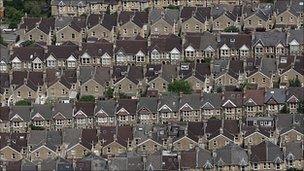Work begins on unique 'energy house'
- Published
Construction has started on an "energy house", a terrace-style home, thought to be the first of its kind in Europe.
Inside the 'energy home' - video courtesy University of Salford
Scientists at the University of Salford plan to use the mock home to test the effectiveness of a wide range of energy saving technologies.
The house is being built inside a three-storey laboratory, which will allow a team of researchers to control heat, light and humidity levels.
The house is set to be ready to begin experiments in December.
The first brick was laid on Monday, and the university's Energy Hub team hopes the project will shed light on the best ways to reduce energy consumption in the UK's existing building stock.
"What we are trying to do it tackle fuel poverty and improve energy efficiency, not only from a technological point of view but from a behavioural perspective too," said Stephen Waterworth, manager of the Energy Hub.
He told BBC News that the scheme will bring together researchers from a wide range of scientific disciplines to analyse the issue and work alongside business and community groups.
'Robust research'
About 70% of the country's residential property will still be inhabited in 2050, and it is estimated that more than 90% of all UK homes would benefit substantially from improvements in energy efficiency.
Research has shown that the country's least efficient properties were predominantly constructed prior to 1920.

The vast majority of homes in 2050 have already been built
Although they comprise 15% of current UK housing, it is estimated that they account for 23% of total national CO2 emissions.
"We need to find ways to make these old-build properties more energy efficient as they will continue to house people for generations to come," observed Professor Stephen Donnelly, dean of the university's Faculty of Science, Engineering and Environment.
"But to cost-effectively retro-fit old properties and make them as carbon-efficient as possible requires detailed and robust research."
The Energy House project is expected to last for about three years before the team will demolish the house and replace it with a replicated public building, such as a hospital ward or school classroom.